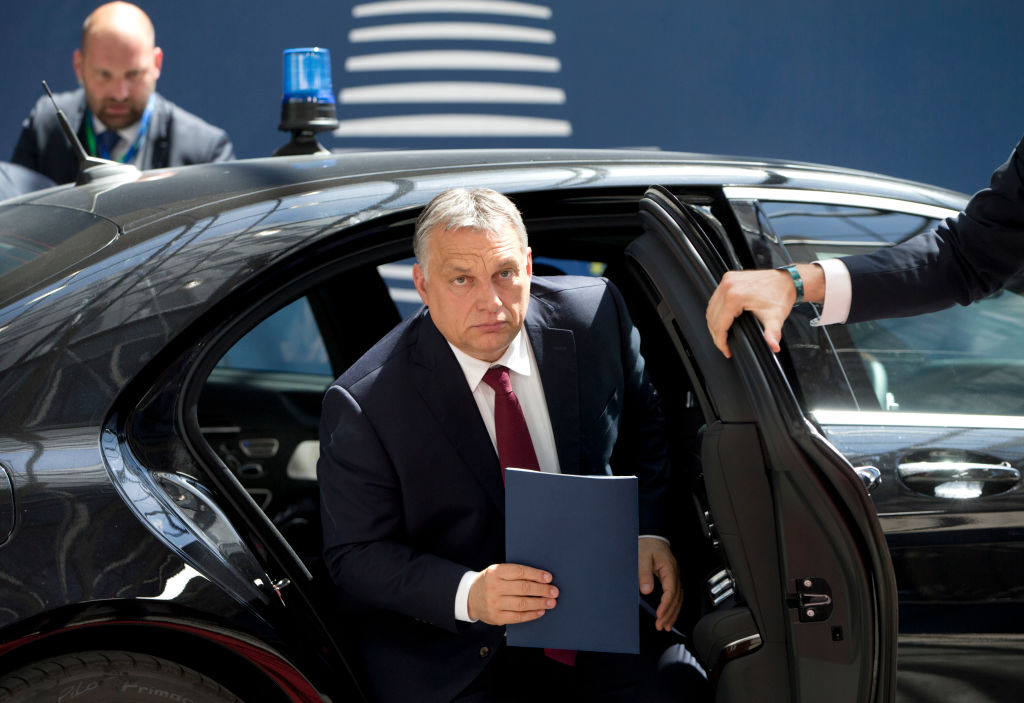For Hungarian prime minister Viktor Orbán, there is only one lesson to be learned from the compromise reached with the EU this week: blackmail works. With the deal, Hungary has managed to partly unblock EU pay-outs in exchange for lifting its veto on an EU aid package to Ukraine and a minimum global corporate tax rate.
After the EU threatened to suspend €7.5 billion in funds for Hungary, Budapest vetoed the €18 billion aid package that the EU had prepared for Ukraine to keep its economy afloat during the war. Now, thanks to the compromise, the suspended amount of Hungary’s funds will be lower – only € 6.3 billion, or 18 per cent of the total amount that Hungary is set to receive.
This is not a complete victory for Orbán. But scholars who see the stand-off between European institutions and Hungary as a conflict over objectively discernible questions of rule of law cannot find any legal basis for the compromise. ‘Legally speaking 100 per cent of Hungary’s funds should have been suspended,’ said R. Daniel Kelemen from Rutgers University.
Clearly this conflict is not just about the law – it is in equal measure a political decision. Yet that makes this week’s decision even more perplexing. While Orbán was able to strike a bargain with Brussels, Poland continues to face the prospect of having its €36 billion from the post-pandemic recovery facility and €75 billion in other EU funds frozen.
Hungary and Poland are often equated when it comes to their rule of law deficiencies, and the comparison is not always unfair. Yet Orbán has been far more ruthless in defanging opposition and independent institutions than the Law and Justice Party (PiS) in Poland. More fundamentally, the two governments have played radically different roles in the most important geopolitical crisis facing the EU since its founding: Russia’s war against Ukraine.
Hungary has operated as Russia’s fifth column, trying to thwart EU sanctions, reaching out to Putin’s regime with the hope of securing cheap Russian gas, and undercutting Ukraine at every turn. In contrast, the Poles have been exemplary. They have given military assistance to Ukraine, built up their own defence capabilities, invested in energy independence, and welcomed millions of Ukrainian refugees. Even with the prospect of the PiS government being voted out of power next year, the case for rewarding Poland’s good behaviour seems obvious.
But by striking a deal with Hungary but not with Poland, the EU has done the exact opposite. Orbán has found out that obstructionism gets results. Unless a much softer deal is reached with Poland soon, radicals within the PiS-led coalition, such as Justice Minister Zbigniew Ziobro, will come to that conclusion as well.
Ahead of the European Council meeting on Thursday, Politico reported that Poland was blocking the EU’s new sanctions against Russia (on the grounds that they included too many carve-outs) along with the bloc’s aid package to Ukraine, Hungary’s recovery spending plan, and the minimum corporation tax. Have the Poles come to the conclusion that compromising with Brussels is pointless, and that Warsaw should deploy the same bag of dirty tricks as Budapest to protect its interests? We will see soon enough.
All of this could have been avoided as well – there was an easy way to deflate the importance of Hungary’s veto. Given Orbán’s character as a bad-faith actor, the rest of the EU could have proceeded (or at least could have threatened to proceed) with the aid package to Ukraine under the terms of ‘enhanced cooperation’ of the remaining 26 member states – instead of following the ‘community method’, which gives the Hungarian government a seat at the table and a veto.
Unfortunately it has become almost a pattern for the EU to never miss an opportunity to miss an opportunity. As well as putting pressure on Poland and placating Hungary, EU interior ministers have also recently denied Romania and Bulgaria entry into the Schengen Area because of pressure from another Russia-friendly capital in Central Europe, Vienna.
Romanians, who have been on the frontline of Putin’s war in the Black Sea, have very good reasons to be vexed about the decision, driven by Austria’s domestic politics. It would be a win for Vladimir Putin if the same countries that have at the forefront of calling out Russia’s aggression and responding to it – namely Poland and Romania – were to reach an understanding that the European project is no longer working for them. This may not be imminent but over the past week the EU has made not an insignificant step in that direction.






Comments